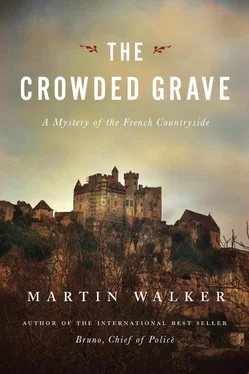Martin Walker - The Crowded Grave
Здесь есть возможность читать онлайн «Martin Walker - The Crowded Grave» весь текст электронной книги совершенно бесплатно (целиком полную версию без сокращений). В некоторых случаях можно слушать аудио, скачать через торрент в формате fb2 и присутствует краткое содержание. Жанр: Полицейский детектив, на английском языке. Описание произведения, (предисловие) а так же отзывы посетителей доступны на портале библиотеки ЛибКат.
- Название:The Crowded Grave
- Автор:
- Жанр:
- Год:неизвестен
- ISBN:нет данных
- Рейтинг книги:5 / 5. Голосов: 1
-
Избранное:Добавить в избранное
- Отзывы:
-
Ваша оценка:
- 100
- 1
- 2
- 3
- 4
- 5
The Crowded Grave: краткое содержание, описание и аннотация
Предлагаем к чтению аннотацию, описание, краткое содержание или предисловие (зависит от того, что написал сам автор книги «The Crowded Grave»). Если вы не нашли необходимую информацию о книге — напишите в комментариях, мы постараемся отыскать её.
The Crowded Grave — читать онлайн бесплатно полную книгу (весь текст) целиком
Ниже представлен текст книги, разбитый по страницам. Система сохранения места последней прочитанной страницы, позволяет с удобством читать онлайн бесплатно книгу «The Crowded Grave», без необходимости каждый раз заново искать на чём Вы остановились. Поставьте закладку, и сможете в любой момент перейти на страницу, на которой закончили чтение.
Интервал:
Закладка:
“Of course,” said Kasimir, as Teddy shook his massive head. “We have it in Poland as well, always at Christmas. We have a sweet white wine from Hungary with it, a Tokay.”
“So the cruelty these PETA people talk about, it doesn’t worry you?”
Kasimir grinned. “If there’s any cruelty, blame Mother Nature. Ducks and geese always stuff themselves to swell their livers before they fly off on winter migration. That’s how they store their energy. Everybody knows that.”
From the look on Teddy’s face, it didn’t appear to Bruno that he knew that gavage, the force-feeding of the birds, was also a natural process. He glanced at Annette. She also looked surprised.
“Well, if you hear of any of your pals making plans to attack more farms, talk them out of it. Or I’ll be making arrests for criminal damage. And Annette here will have to bring charges. That’s her job.” Bruno turned away, then looked back at Teddy.
“One more thing. Rugby practice is tomorrow evening at six, if you’re interested, and again at nine on Saturday morning. We have spare gear at the stadium-you know where it is? First left after the Bricomarche, and you’ll see the rugby posts.”
“Thanks,” said Teddy, looking surprised. “I’d like that.”
“You might want to bring Kajte along,” Bruno added. “And tell her to be careful where she does her photocopying.”
Teddy’s cheerful face suddenly clouded, and he looked away.
“What was that last remark about?” Annette asked as they headed back to Bruno’s car.
“I made a few inquiries. Kajte was doing the photocopying for the dig, work rotations and stuff. I think she photocopied the leaflets that were left on the wire, and I checked the websites she was using-she was looking up PETA slogans and campaigns.”
Annette stopped in her tracks, her expression horrified and her voice suddenly shrill. “You searched her private computer?”
“No, I looked at the public computer she used in the tourist center,” said Bruno equably. “She hadn’t cleared the cache. No privacy was breached, and the computer is owned by St. Denis, so I have every right to consult it.”
Annette nodded, but still looked troubled. Then she looked at him challengingly. “But if you have a case against somebody, why give them a warning like that? It’s not as though you share their sympathies about animal rights. And I should let you know that I do, and if there are any cases of wanton cruelty to animals, there are statutes against it that I would want to enforce.”
They were walking side by side, amiably enough, although there was a sharper tone in her voice. But she seemed ready to listen. Bruno was reminded of times in the army when a new officer had come to take over the squad. It was always Bruno’s job as sergeant to educate him, buff away the officer-school polish and teach him how to make forty tough young soldiers obey their orders cheerfully. He wondered if Annette would be amenable to some gentle coaching, after making such a disastrous entry into St. Denis. He’d have to try. Nobody would benefit from a constant tension between town and magistrate.
“I want to stop it now before it gets any worse,” he said. “You must have seen angry farmers on TV, dumping cartloads of manure on the steps of a mairie, blocking roads with tractors, throwing bureaucrats into the river. That’s what could happen here unless we can defuse the situation. It would hurt the museum and mean trouble for my friend Horst, a German professor who runs the dig.”
“He wasn’t there today?”
“No, he’s giving a public lecture at the museum tonight so he was probably preparing that. I’m looking forward to it. He’s a good speaker, he’s passionate about this prehistory, and I’ve been getting some hints that he has something big to say. If you have nothing better to do, you might want to come along and listen, meet some of my friends and start to understand what’s so special about this valley.”
6
Bruno recognized the image on the giant screen, the deep pit he had seen that morning at Horst’s dig, the flat stone with the strange cup-shaped depressions and the smoothness of bone. A small ruler, in red and white with gradations for each ten centimeters, lay alongside what Bruno could now identify as a human femur. The red spot of Horst’s laser pointer picked out the details he chose to highlight on the enlarged photograph as he spoke.
“A new prehistoric burial site in this region is always a remarkable discovery and this one with its two adults and child may be very special indeed,” Horst was saying from the podium.
The auditorium at the new National Museum was filled, with some of Horst’s students standing at the back and more listening to his lecture through a loudspeaker in the hall. Bruno counted well over a hundred seats, another score or so against the walls and with the overflow there must have been two hundred people in attendance, the largest audience Bruno could remember. Nor did he recall ever seeing TV cameras at the back of the hall before, and for once Philippe Delaron from the local Sud Ouest newspaper was not the only reporter present. Bruno sat between Pamela and Fabiola, with his tennis partner, the baron, next in the row and the new magistrate beside him. Annette had changed into jeans and a white silk shirt that looked expensive. Pamela was wearing a light green sweater that Bruno guessed was cashmere. It set off the hints of red in her bronze hair.
The skeletons, Horst was saying, were around thirty-three thousand years old. That meant they came from the pivotal period when the Neanderthals were being replaced by the Cro-Magnons, modern mankind. Horst paused, then stepped out from behind the podium toward the front of the stage, his face suddenly illuminated by the light from the projector. His shadow fell thick and long on the screen behind him. It was a deliberately theatrical move. His eyes must have been blinded by the projector light, but he swiveled his head slowly as if to look at each part of the audience before he spoke again.
“This is the great mystery of modern man. How did our ancestors live and prevail while the Neanderthals disappeared? Was it war or disease that wiped them out?” Horst paused again, and raised his arms and slowly let them fall, as if in bafflement. “Or perhaps it was simply evolution, or maybe the inability of the dwindling Neanderthal gene pool to adjust to rapid and repeated changes in climate. Perhaps they could not compete for limited food supplies. Each of these theories has been proposed.”
Horst paused again, his delivery given gravity by the way the light of the projector, playing on his white beard and casting stark shadows on his cheekbones, gave him something of the look of an Old Testament prophet. He stroked his beard thoughtfully before lowering his voice to speak in almost conversational tones.
“But we do know that almost every creation myth in human culture keeps alive the terrible and haunting possibility that our ancestors prevailed though deliberate violence, that they destroyed their competitors. It is indeed possible that modern humankind was born through an act of genocide. Some scholars have suggested this might be the real original sin.”
Bruno found himself sitting forward, almost on the edge of his chair, unexpectedly captivated by Horst’s narrative. This was not like the other talks by Horst that Bruno had attended, one on cave art and the other on the diet of the people who had produced it. They had been interesting but somehow passionless, as if Horst were playing the role of scholar. Now, however restrained his delivery, Horst seemed to be afire.
Behind Horst on the screen the images of two early humans appeared side by side. One was squat and hairy, with a thrusting forehead, a barrel chest and long arms. This was the image of the Neanderthal, of the brutal caveman that Bruno recalled from schoolbooks. The other was taller, slimmer, with a narrow skull and features that were somehow more familiar as human, despite the clothes of fur. Bruno felt a sudden chill, thinking of other contrasting images he recalled from his schooldays, the way Nazi propaganda had depicted Jews as alien and thuggish creatures to make the contrast with the Aryan as some human ideal. Was it so easy to indoctrinate through images, he wondered, or was Horst right to suggest some human archetype at work from thousands of years ago?
Читать дальшеИнтервал:
Закладка:
Похожие книги на «The Crowded Grave»
Представляем Вашему вниманию похожие книги на «The Crowded Grave» списком для выбора. Мы отобрали схожую по названию и смыслу литературу в надежде предоставить читателям больше вариантов отыскать новые, интересные, ещё непрочитанные произведения.
Обсуждение, отзывы о книге «The Crowded Grave» и просто собственные мнения читателей. Оставьте ваши комментарии, напишите, что Вы думаете о произведении, его смысле или главных героях. Укажите что конкретно понравилось, а что нет, и почему Вы так считаете.












